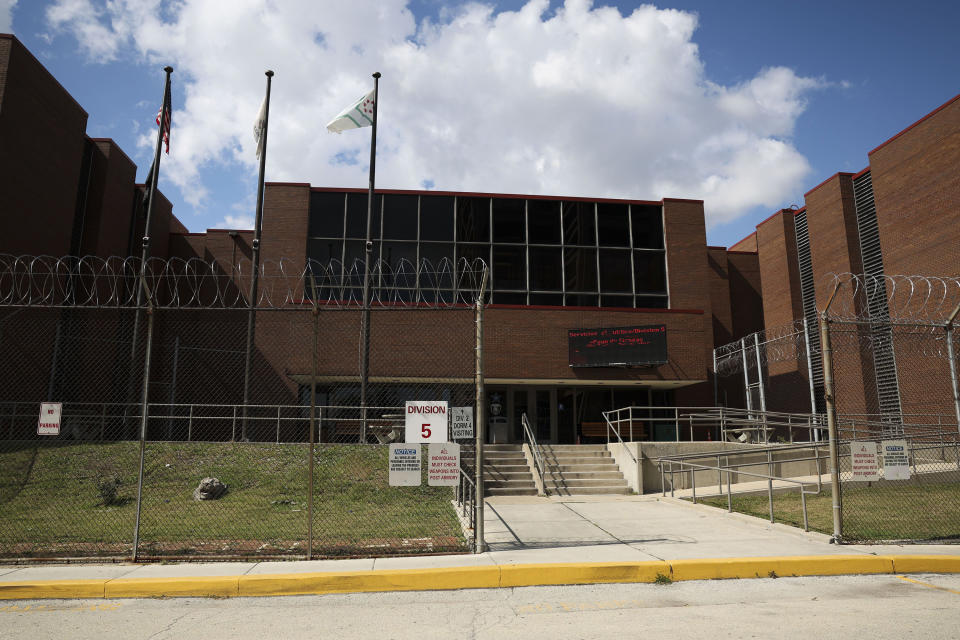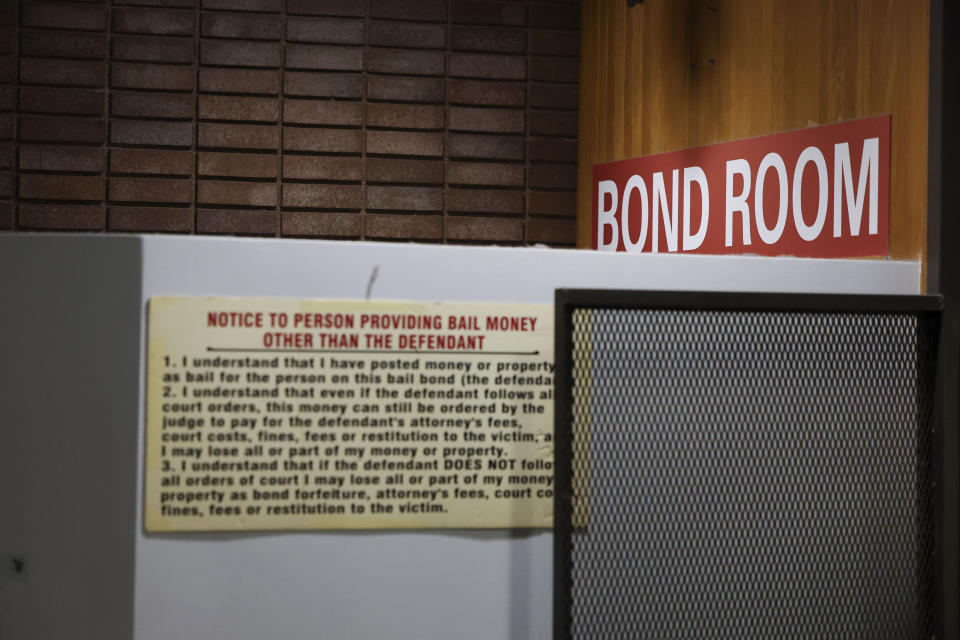Illinois appeals courts see ‘dramatic increase’ in cases following elimination of cash bail
- Oops!Something went wrong.Please try again later.
In October in Livingston County, Judge Jennifer Bauknecht issued a lengthy decision following a detention hearing just weeks after cash bail was abolished across the state.
“All right. Since its founding, this country has used monetary bonds in conjunction with pretrial conditions as an effective tool for ensuring that a defendant is not a risk of harm to others in the community, does not commit any criminal offenses while out on bond, and that he appears as directed at all future court dates,” Bauknecht began.
She told the defendant, charged with soliciting a child, that prior to the Pretrial Fairness Act, the landmark legislation that took effect in September, she would have “given the defendant a reasonable monetary bond,” according to an appeals court decision. But without that discretion, she said, she ordered him detained.
An Illinois appeals court vacated her decision, finding that the court “improperly focused on its ‘disdain’ for the recent statutory changes.”
The pretrial appeal of Bauknecht’s decision is among hundreds filed since the legislation took effect. The opinions offer glimpses at how the new legislation is playing out across the state and clarify untested portions of the statute, but the appeals have come in such a volume that the state’s highest court has convened a task force to examine what it called a “dramatic increase” in the number of cases sent to appellate courts.
From Sept. 18, when the law took effect, through the end of the year, more than 1,300 pretrial appeals of detention decisions were filed in the state’s five appellate districts, an increase that comes on top of the normal caseload.
In all of 2022, there were 1,981 criminal appeals filed across all five districts, according to data from the court.
Stakeholders point out that appellate review is a critical part of the law’s implementation and that a jump in appeals was expected. In preparation, the state allocated funds to the offices of the state appellate prosecutor and state appellate public defender, which are handling the bulk of most of the appeals outside Cook County, though local lawyers submit the initial paperwork.
Still, the Illinois Supreme Court’s task force will review the impact on caseloads and issue a report.
“It’s not insurmountable, but it’s a challenge,” said William Bertram, a special public defender in Livingston County who handles the paperwork to jump-start appeals for his clients.
The Pretrial Fairness Act, part of a broad array of criminal justice reforms passed as part of the SAFE-T Act, abolished cash bail as a potential condition for release and changed the way pretrial hearings are conducted.
Proponents of the law have long argued that cash bail deepened disparities in the system by disproportionately jailing people too poor to make bail. In addition to the bail measure, the law also seeks to even the playing field for defendants up for their first court appearance, with more robust hearings and opportunities to evaluate the evidence more closely.
The cash-bail measure has been controversial for those concerned about the public safety impact of the provisions — particularly Republicans. Opponents of Gov. J.B. Pritzker have sought to paint him and his Democratic allies as weak on crime — though studies of bail-reform measures in other jurisdictions have not shown a significant effect on recidivism or failure by defendants to appear in court.
Lawmakers delayed implementation for two years so jurisdictions could prepare for the changes, and it was further stalled by a lawsuit from prosecutors across Illinois who challenged the law’s constitutionality.
The law allows defendants up to 14 days to appeal a judge’s decision on detention or other pretrial restrictions.
Sharlyn Grace, a senior policy adviser for the Cook County public defender’s office, said the office has a designated group of assistant public defenders to work on the nonprivate appeals coming out of Cook County.
Grace said she doesn’t believe the appeals will continue at the same volume given that facets of the law will get clarified through this first swarm.
“As we get more decisions and as trial courts and attorneys have more direction from appellate courts, I think the number of appeals is going to decrease,” she said.
The state’s appellate system is broken into five districts, with Cook County encompassing one district on its own. Since bail reform was implemented, Cook County’s appellate district notched the lowest number of pretrial appeals — 161.
The second district, which encompasses Lake, Kendall, Kane, McHenry and Dekalb counties, saw 190 appeals. In the third district, which includes DuPage and Will counties, there were 193.
More than half of the appeals came from the rest of the state, with 438 appeals from the fourth district, which encompasses the Peoria and Rockford areas and much of the western part of the state, and 394 from the fifth district, which includes Champaign-Urbana and southern Illinois.
In the fifth district, more pretrial appeals were filed in the three-month period post bail reform than criminal appeals in that district during all of 2022, according to court data.
Cook County had the fewest pretrial appeals, despite having more overall criminal appeals than the other districts in 2022.
Grace noted that unlike most of the rest of the state, the county had been working under a similar framework for reviewing pretrial risk prior to the change. She also said some prosecutors in other parts of the state are seeking detention on every eligible offense.
Bertram said he files about five notices for appeals a week, which are then sent to the State Appellate Defender, which handles the briefs and arguments. With nothing to lose, generally clients opt to appeal a detention order, he said, and defendants can file multiple appeals throughout the span of a case as the decision to detain is re-reviewed.
“Some of this may be just: It’s new and we need to get used to it and adjust,” he said, though he added, “I think there’s some fine-tuning the Pretrial Fairness Act could use to make it run a little smoother.”
Appellate court decisions have mostly affirmed the trial courts’ original decisions regarding pretrial detention or requirements, but justices have reversed decisions for a number of reasons, in some cases finding that prosecutors failed to show that a less restrictive condition could keep the public safe.
In other cases, justices reversed decisions because prosecutors sought detention even though a monetary bail was already issued before the law took effect, a circumstance that will become less frequent as more time passes.
“Appeals are good. They help us clarify what the law says in places where it might be ambiguous,” Grace said. “Appeals are how we learn how the law applies to real people and real fact patterns.”
_______
____


